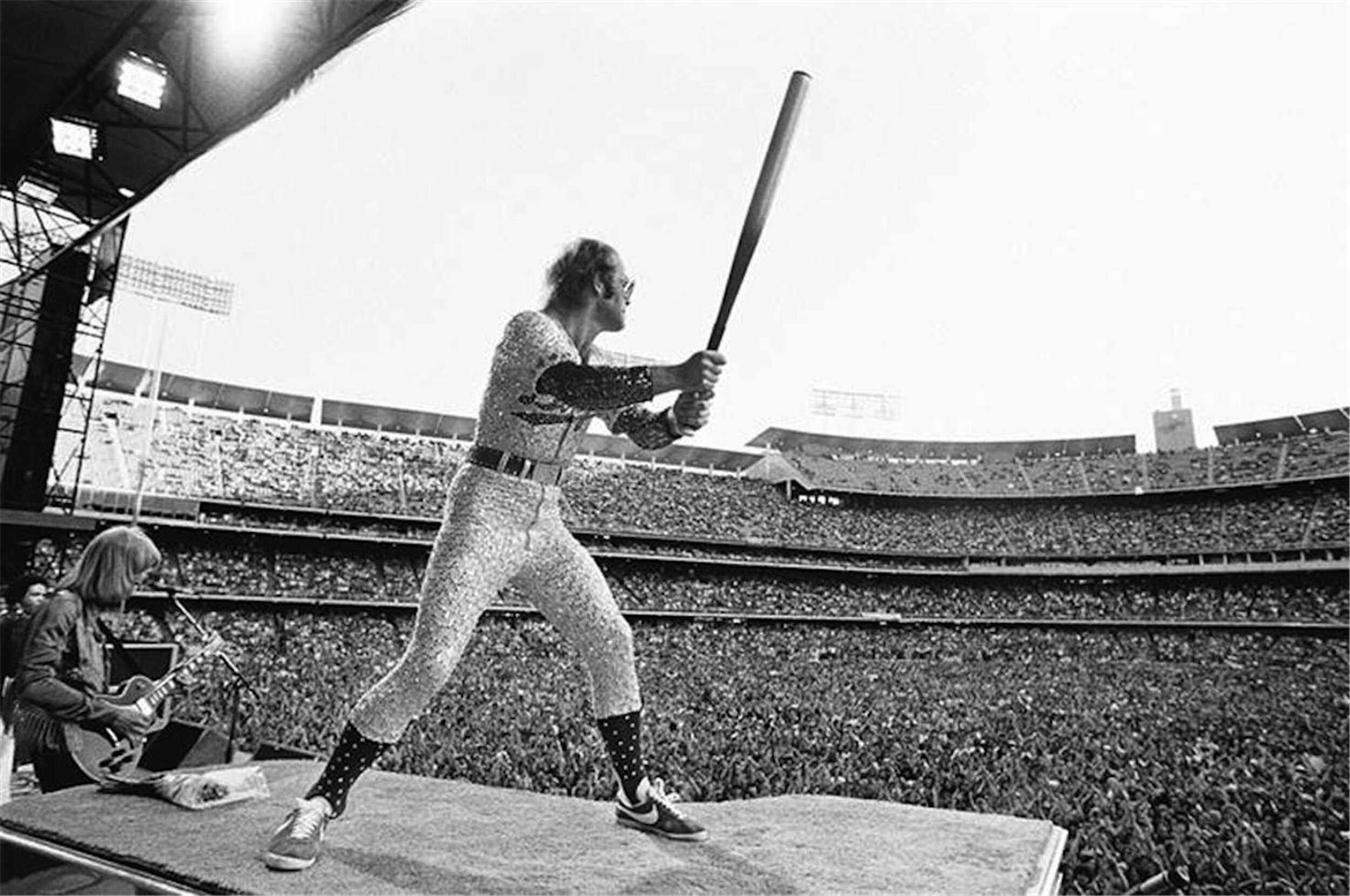Rick Clark: Madman Across the Water was the zenith of that larger-than-life sound. The follow-up album, Honky Chateau, was an earthy, folky, funky kind of effort.
That started a whole different thing, really. That’s when we went to France for the first time because Elton was being advised by accountants to record abroad, but more importantly, to write the songs abroad, he wouldn’t be paying English tax. I asked to see if I could find something in France and I’d almost given up when somebody tipped me off to Chateau d’Herouville where the Grateful Dead just did an album. As soon as I saw it, I went, “Yeah, this has to be the place.” And it turned out to be, as luck would have it, a very successful choice.
Rick Clark: Goodbye Yellow Brick Road also cut there.
Yeah. Well, I must admit, the only reason that it became a double album was because we’d been to Dynamic Sounds in Jamaica anticipating to possibly record there, and I just couldn’t get a sound together at all. It was weird. The Stones had just recorded there and they were checking out as we checked in. They told us a few slightly scary stories like don’t open the piano lid too fast or you’ll upset the cockroaches that live in there — things like that. It took me three days to get a decent drum sound, and eventually we said, “This isn’t going to work.” So we said, “Let’s go back to the Chateau. We know we can work there and it will be fine.”
Now at this stage, Elton would write all of the songs for each album in the studio during the five days beforehand. He already had an album’s worth of songs together that he wrote right before we started recording in Jamaica. But when he arrived at the Chateau, he felt like writing some more songs. It was like starting another album project. So he wrote some more songs, and all of a sudden, we had more than a double-album’s worth of material. It was only because he wrote two albums — one after the other — because we cancelled the first one. So if we had gone to Jamaica and the sessions had been successful, it would have been a single album. I’m pleased to say that it still is his most successful album.
Rick Clark: I remember being swept away by “Goodbye Yellow Brick Road” the first time I heard it. That song always felt like it always existed, sort of like how David Bowie's "Life on Mars" makes me feel.
Gus Dudgeon: Well, what I regret about a lot of today's music is lack of personality. That album is just chock full of personality. It's real performances and real playing, and you know that there are no click machines. Consequently, anything that's any good that is on it is down to the individual's ability on his particular instrument.
Rick Clark: I've always liked the way harmony or background vocals worked on some of those Elton albums.
Gus Dudgeon: Thanks. If you listen to the number of backing vocals on the average Elton John album, there's a lot of it, and it is all top-notch. And a lot of it took a lot of time and hard work, but every second of it was a buzz. All the time we were doing those backing vocals . . . every time we finished a chorus . . . we'd go, "Whew! That was bloody hard work!" You know we might've worked five hours down the line on that section, and then we go right, "Next chorus!" But of course, what happens on the next chorus, cause we'd been around it on the first chorus, as we now had a method of doing it. We'd know which part went on first, which part went on second, blah, blah, blah. But every single part was sung again. Everything.
Rick Clark: Everything. And it had it's own anomalies?
Gus Dudgeon: Of course it did, yes.
Rick Clark: All that time wasted on imperfection!! You could’ve simply flown tracks around. (laughs)
Gus Dudgeon: (laughs) No! That's so boring. Lazy, and it's cheap. It is only done cause there is gear around that is able to do it. And then there is autotune! Come on!
And another thing I hate is that most people's stereo records are just very large monos. There's a guitar on the left, so well, we better put one on the right. Why? What's wrong with the solo coming out of one side? If it sounds good there, put it there! Why is the solo always in the middle? How boring is that?
Rick Clark: Here’s an idea: we could have a revival of the tambourine as one of the loudest elements in the mix.
Gus Dudgeon: Right?!?! (laughs) Some of the early Motown records had the tambourine was twice as loud as the drums. Which is nuts, but it totally worked.
But you also know that no one went into the control room saying, "Right, I want to make a record today with the tambourines twice as loud as the drums." (laughs) No one did it. It just turned out that way. So for whatever reason, it doesn't really matter. But it doesn't stop it being a hit.
If you listen to the Kinks records, they actually managed to distort acoustic guitars on their hit records. To me, it is extraordinary how an engineer can sit through a distorted acoustic guitar throughout the entire session and the mix. It's completely beyond me. So it's there, but it didn't stop the bloody things from being hits.
Rick Clark: Speaking of mixes. Tell me a little about your methodology or challenges at the time.
Gus Dudgeon: When I used to do mixes with Elton, we often had three people sitting on the board, me, the engineer, and usually the tape jockey leaning over the top of the desk, who's job was to pan something from one side to the other, or hit an EQ button, or switch a reverb on for a few seconds or switch it off again. We always used to sit there saying, "God wouldn't it be great if you could have an automatic third hand?" Well, the computer became the third hand, so to speak. But the problem with a computer mix is, you start off making it dynamic, and then you'll notice for instance, that you've lifted a drum fill and you go OK, and so you play it back several times, and then you think well actually that drum fill I've lifted sounds great, but there's this really nice little bass line out there that's getting lost, and actually, the high hat is kinda getting lost at that point as well. And maybe there's a tambourine running through it, so you think at that point the tambourine could come up just a tad to keep pace with the drums. By the time you've finished, the dynamic has been flattened out again. For me, computer mixing is a confidence chase. You can do too much, so consequently, you do it all. That, for me, is the problem.
Rick Clark: Before computerized mixing came along, you had to have done your share of editing with a razor to arrive at some of your final mixes.
Gus Dudgeon: I used to do all my own editing. Having done God knows how many thousands of edits at Decca, it's one of those things I'm actually particularly good at doing.
For example, I would do six or eight mixes of a song, and then when I thought I had maybe a couple of mixes that were 99% of the way there, I'd look for the bits I never quite got right and simply cut in a better section from another take. That's what I did throughout the Captain Fantastic album as well as all those Elton albums back then.
I used to do the same with multi-track recording as well. If you did half a dozen takes, and there was one take that happened to be kind of shitty, but it had a great middle section, I would cut it into the other takes. I'd just cut the best bits together, obviously doing razor blade edits. OK, the risk, of course, is if you fucked the joint up, undoing it and trying to put it back together again could be a bloody nightmare. But that's the risk you take. You're just very, very careful when you edit.
Rick Clark: No, shit!
Gus Dudgeon: (laughs) There's nothing to touch that moment when the red light turns on. And the guy starts counting it in. And you sitting there, waiting for the moment when it happens and you think what's going to happen? It could be a false start or a great start and then fall to pieces in the middle. But you might think, "Shit, I've got to have that intro. That intro is fantastic!" So you use that intro and cut it on to another take. Simple as that.
You know, I always forget what I did in a mix cause I never listen to my own work, like most producers. Once I've done it, and it's pressed, and out there, I just cross my fingers and hope for the best, and that's that. I'll occasionally hear a song I did the radio, and suddenly realize, "Oh yeah, I can remember now! I can hear the point at which the drums are pushed up, and the ambiance comes up behind it, and there is this extra sort of ump. Well, that would have been a mixing move I probably decided a split second before it happened. You follow your instinct … how it feels to you, and when you trust that feeling, you usually go, "Oh that really worked a treat!" So you try it again on the next drum fill and then you keep doing that until you get to a point where you've made a mark on the board.
I always used to use chalk marks on the board, as my kind of "that's as far as I'm going to go." And then there'd be another drum fill where you want to do it, and it just isn't hitting the kick quite as hard, so the ambiance has to be pushed, you know, an extra couple of dBs to make up the difference because it's not reaching into the room in the same way.
All those early mixes of Elton's, before I got anywhere near a computer, are all hand-cranked, and I loved working that way! I much prefer them to quite honestly anything I've really done on computer since. Anything I do on a computer, I just wind up dicking around with things forever and driving myself mad.








